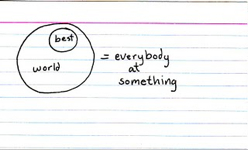 At ISTE 2011 in Philadelphia this week we were blessed with gorgeous summer weather, hot but not oppressive days and cool evenings perfect for a city walk. The show was hot too, well attended and and well run. So it may seem like an odd time to declare that this trade show’s days are numbered. Tech shows like ISTE and TCEA are surging in attendance while warhorses like IRA go begging for attendees. Received wisdom is that everything is moving to the tech side.
At ISTE 2011 in Philadelphia this week we were blessed with gorgeous summer weather, hot but not oppressive days and cool evenings perfect for a city walk. The show was hot too, well attended and and well run. So it may seem like an odd time to declare that this trade show’s days are numbered. Tech shows like ISTE and TCEA are surging in attendance while warhorses like IRA go begging for attendees. Received wisdom is that everything is moving to the tech side.
I’m going out on a limb to argue that the trends of the last 5 years, declining core content shows and strong attendance at pure tech shows, are about to reverse themselves. In the coming years we’ll see a resurgence of IRA, NCTM, and other content shows. ISTE will wither to a hard core platform technology event.
After IRA I noted how tech unfriendly the event was – they have a long way to go in encouraging and recruiting tech solutions. As I strolled the floor at ISTE in Philadelphia this week noticed the flip side of this coin. There was very little in the way of core content solutions that are delivered in genuine transmedia packages. It was ALL technology, PURE technology.
 The Education Business Blog
The Education Business Blog


 At
At  When educators choose new classroom materials their first challenge is to sift through dozens of options and narrow the search down to four to five options. In other words before they say “yes” to one solution they need to find reasons to say “no” to a host of other options.
When educators choose new classroom materials their first challenge is to sift through dozens of options and narrow the search down to four to five options. In other words before they say “yes” to one solution they need to find reasons to say “no” to a host of other options. How do you find a job in education publishing or technology?
How do you find a job in education publishing or technology? Guest blogger
Guest blogger 

 Education technology bloggers have been a busy lot with NECC 08, end of school year, and lots of new products to play with. Here are just a smattering of some of my favorite posts from the past few weeks. Enjoy.
Education technology bloggers have been a busy lot with NECC 08, end of school year, and lots of new products to play with. Here are just a smattering of some of my favorite posts from the past few weeks. Enjoy.